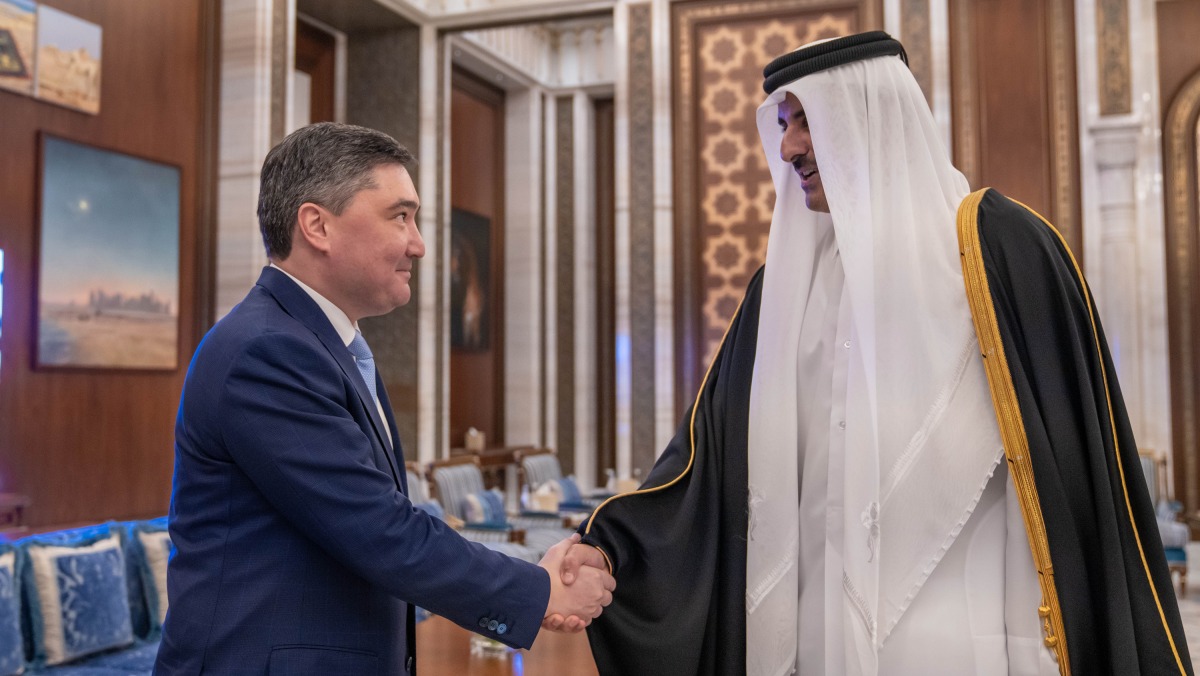The meeting touched on the bilateral relations between the two countries and the means to enhance them, in addition to several regional and international issues of joint interest.
Qatar’s Amir Sheikh Tamim bin Hamad Al Thani welcomed Kazakhstan’s Prime Minister Olzhas Bektenov at the Lusail Palace on Wednesday, where they discussed exploring avenues to boost bilateral relations.
The discussions delved into their bilateral relationship and means of fortifying and expanding cooperation across various sectors.
Both leaders exchanged views on strategies aimed at elevating the existing ties to new heights while addressing pertinent regional and international matters that resonated with the interests of both nations.
Qatar’s Prime Minister Sheikh Mohammed bin Abdulrahman Al Thani also met with Bektenov and discussed developing relations, especially in the economy, investment, and industries.
Following that session, an agreement was inked between Qatar and Kazakhstan on a long-term strategic partnership to develop projects in the field of priority industries.
Earlier in February, Kazakhstan’s President Kassym-Jomart Tokayev visited Qatar for bilateral talks with Qatar’s amir.
During his two-day visit, the Kazakh leader participated in the Qatar-Kazakhstan investment round table with several Qatari businessmen.
Also then, Sheikh Tamim and Tokayev witnessed the signing of several pivotal agreements and memoranda of understanding (MoU) between their two nations.
The ceremony marked a milestone in enhancing cooperation across a wide range of sectors including legal, employment, information technology, social development, youth initiatives, integrity, banking, telecommunications, energy, and infrastructure projects.
Among the agreements, the two leaders observed the signing of a crucial pact on mutual legal assistance in criminal matters, setting a new precedent for judicial cooperation.
A significant agreement on workforce management was also formalised, promising improved bilateral collaboration in managing and protecting labour rights.
The ceremony also saw the endorsement of a memorandum of understanding for cooperation in the realm of communications and information technology.
A notable highlight was the initiation of the first executive program for cooperation in the field of youth for the years 2024 – 2026.
The economic and technological sectors received a significant boost with the signing of an agreement between Qatar’s Lesha Bank and Kazakhstan’s Baiterek Venture Fund, alongside a strategic agreement with the Mobile Telecom Service company.
Energy and infrastructure projects were also a focal point, with the signing of a memorandum of understanding that encompasses several projects aimed at energy development, including the construction of a power generation station and a gas processing plant in the Kashagan Field.
Qatar and Kazakhstan
Sheikh Tamim’s visit in June 2023 was seen as another step to develop ties between Doha and Astana, which were established three decades ago.
Notably, Qatar was among the first Arab countries to recognise Kazakhstan’s independence.
Doha’s first investments in Kazakhstan were made in 1997 when the capital was transferred from Almaty to Astana. Qatar also funded the construction of the Astana Mosque, a key landmark in Kazakhstan’s capital city.
In 2020, Qatar was one of the first countries to provide Astana with medical assistance to help health authorities combat the COVID-19 outbreak. At the time, Doha provided medical assistance and vaccines to various countries worldwide as part of efforts to join the global fight against the pandemic.
In 2022, Qatari investments in Kazakhstan stood at an estimated almost $113 million, out of which $100 million belonged to the Qatar Investment Authority, according to the Qatar News Agency.
The remaining $13 million belonged to the Qatar Fund for Development.
Last year, Kazakhstan said it was ready to diversify and increase its exports to Qatar to reach $250 million.
Kazakhstan also shares strategic borders with countries such as China and Russia and its geographical location enables it to benefit from the fields of mining and agriculture.
In 2023, Kazakhstan was the fifth globally in the export of wheat and one of the 20 oil-producing countries, according to QNA.
Kazakhstan is among the most important economies in Central Asia, making up 80 percent of the region’s volume of mutual trade. Its intra-regional trade had increased from $5.8 to $10 billion (73.4 per cent) between 2018 and 2022, according to The Astana Times.







